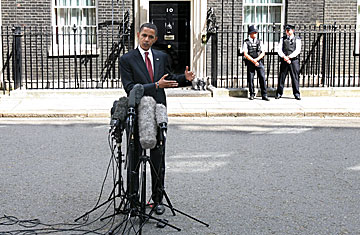
Candidate Obama speaks in front of 10 Downing Street.
As Barack Obama headed home from his triumphal weeklong tour of the Middle East and Europe, the biggest question is how much of the love he got overseas is going to rub off at home. Certainly, the polls are not showing it. Despite a dismal week in which John McCain struggled to be heard through the saturation coverage of Obama's trip, the Republican nominee actually seemed to be getting stronger in some key battleground states.
Obama's advisers, however, say polling is not a measure of the impact of a week in which Americans saw Obama taking a helicopter ride with David Petraeus, the commanding general in Iraq, and sinking a three-pointer in a basketball game with troops in Kuwait; receiving what amounted to an endorsement from a smitten French President Nicolas Sarkozy, and addressing a Berlin crowd of 200,000 — three times larger than any he has ever drawn in the United States. "I don't think these are the issues that are driving the polls right now," said David Axelrod, the Obama campaign's chief strategist. "I think the economy is driving the election, and it will continue to drive the election." That is why the campaign says that, upon his return, Obama will sharply pivot to talking about domestic concerns.
The trip was a reminder, too, that Tip O'Neill's adage about politics being local applies overseas as well. Two of the countries on his itinerary — Israel and Britain — are likely to see changes in government in the near future, so Obama made a point of meeting with leaders across the political spectrum. You could also see their domestic political concerns at work in how those foreign leaders approached Obama. Sarkozy, for example, has been under sharp criticism at home for his pro-American posture; it certainly didn't hurt him to be seen swooning over the only American politician whose motorcade through Paris would be met by thousands of cheering Frenchmen. When Obama went to Sderot, an Israeli town at the edge of Gaza that has been pounded for years by Palestinian rockets, he was accompanied by both Defense Minister Ehud Barak and Foreign Minister Tzipi Livni, who may be rivals in a bid to succeed Prime Minister Ehud Olmert.
The final day of Obama's trip seemed to be a metaphorical stroll from Britain's past to its future. He had breakfast at his hotel with former Prime Minister Tony Blair, now a Middle East envoy for the international community. It was followed by a meeting with the embattled current one, the Labor Party's Gordon Brown. Obama then proceeded to one at the parliament building with the youthful and charismatic David Cameron, leader of the Conservative Party opposition. Also at 10 Downing Street while Obama was there: David Lammy, one of two black ministers in Brown's government, who has tried to style his own political career on Obama's.
It has not always been to a politician's advantage to be loved in Europe — just ask John "Looks French" Kerry. Republicans are hoping that Obama's trip will backfire with voters as an exercise in presumption. "This week the presidential contest was a long-distance affair, with my opponent touring various continents and arriving yesterday in Paris," McCain said in his weekly radio address. "With all the breathless coverage from abroad, and with Senator Obama now addressing his speeches to 'the people of the world,' I'm starting to feel a little left out. Maybe you are too."
But that kind of tack may not work as well as it did four years ago. In a June poll, the Pew Research Center 71% of respondents said the U.S. is less respected in the world than it used to be; for the first time since Pew began asking that question in 2004, a majority said they consider that a major problem.
In the longer run, Obama's greatest political gain from the trip may come from the respectful reception he has gotten from foreign leaders. Polls show that the biggest area where he consistently trails McCain is on the question of whether he would be a good commander-in-chief. The image that voters got this week was of a candidate who could stand shoulder-to-shoulder with the country's key allies.
